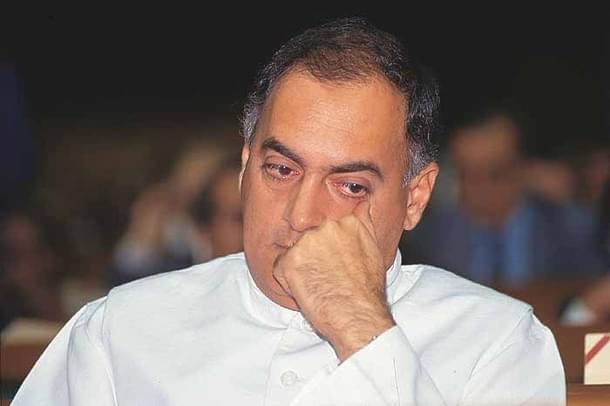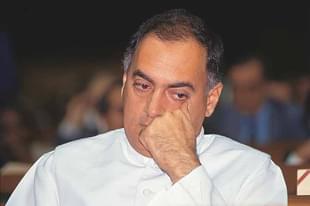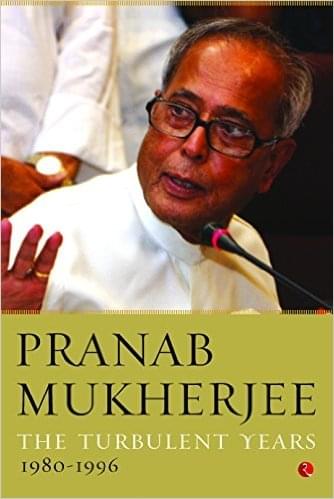Politics
Pranab Mukherjee On Why He Fell Out With Rajiv Gandhi
Book Excerpts
Feb 07, 2016, 02:10 PM | Updated Feb 10, 2016, 04:42 PM IST
Save & read from anywhere!
Bookmark stories for easy access on any device or the Swarajya app.


In the second volume of his memoir The Turbulent Years: 1980-1996, Pranab Mukherjee looks back at his relationship with Rajiv Gandhi, and why things might have turned sour. Edited excerpts:
My personal equation with Rajiv was always good, though limited, before Mrs Gandhi’s assassination. Prior to his joining politics, we just exchanged pleasantries when we happened to run into each other. His reaction was sharper than that of Sanjay when Mrs Gandhi was arrested on 3 October 1977.
After Sanjay Gandhi’s death, there was a ‘Rajiv Lao’ campaign. While people like H.K.L. Bhagat and Buta Singh actively campaigned for his entry into politics, I took the position that he was most welcome but it was for him to decide. After being elected an MP from Amethi, he was made the AICC General Secretary. The frequency of our meetings increased. We interacted on all major issues. I attended programmes he organized to interact with Congress workers and there was no animosity between us or a divergence of views. There was no cause for him to suspect or distrust me.
I was, however, a very busy person in the early 1980s, handling several important and demanding portfolios, including Finance. Rajiv, on the other hand, had a group around him comprising people like Arun Nehru, Arun Singh and Vijay Dhar. Janardhan Poojary, my Deputy Minister in the Finance Ministry, used to tell me frequently that these individuals were plotting against me, but I didn’t pay heed, assuming this was idle gossip.
Then, there was the tussle between Swraj Paul and DCM/Escorts, which I have already discussed in a previous chapter. Both Swraj Paul and H.P. Nanda have written in their memoirs about the role played by Rajiv during the controversy, and its final resolution. Rajiv discussed the matter with me several times, but at no point did he express any displeasure with my actions.
After Rajiv assumed office, many foreign correspondents asked me whether he was an interim Prime Minister. I categorically replied that there was no provision for an interim government in our Constitution, and Rajiv Gandhi had been appointed as a regular Prime Minister by the President on the advice of the CPB and this decision had been subsequently ratified by the CPP.
Perhaps I should have sensed Rajiv’s growing unhappiness and the hostility of those around him and taken pre-emptive action. However, I remained engrossed in my work, as is my usual way. Many of my actions, all without malice or intent, were used by my detractors to project me as someone unwilling to accept Rajiv’s leadership. Petty things were blown up into huge issues.
For example, an interview I gave on 31 October 1984—in which I stated that the economic policies of the government would be continued—was interpreted as questioning the authority of the Prime Minister. While I had given the interview to quell any uncertainty about India in the international markets following the assassination of Mrs Gandhi, it was portrayed as presumptuous and unmindful of Rajiv’s authority.

Similarly, when Rajiv Gandhi visited West Bengal to campaign for the 1984 elections, I was unable to accompany him because of important meetings in Delhi. I had invited some foreign guests in my capacity as Chairman of the G-24 developing countries’ group of finance ministers associated with the World Bank and IMF. I was accused of ignoring the Prime Minister and Congress President when he was campaigning in my home state.
Another incident occurred during the meeting of the CPB to select Congress candidates for the general election of 1984. The nomination of the incumbent Lok Sabha members, Kamal Nath from Chhindwara in Madhya Pradesh and Professor Nirmla Kumari Shaktawat from Chittorgarh, Rajasthan, was opposed by some people close to Rajiv, including Arun Nehru. I strongly protested and insisted on their nomination. The vehemence of my protest perhaps displeased Rajiv, who repeatedly said, ‘Reserve it for the consideration of the President’—meaning himself.
Clearly, Rajiv did not like my proximity to Kamalapati Tripathi. Media reports speculating about dissident activities may also have angered him.
To return to the question of why he dropped me from the Cabinet and expelled me from the party, all I can say is that he made mistakes and so did I. He let others influence him and listened to their calumnies against me. I let my frustration overtake my patience.
Overall, the difference in age between Rajiv and I was only nine years. When I was dropped from the Cabinet, I was not even fifty years old. But we were clearly of very different backgrounds and temperaments. Rajiv was a reluctant politician. He was forced by circumstances to become Prime Minister at the age of forty. He was ahead of his times. He wanted rapid change and saw the old guard in the Congress as an obstacle to his vision. He was forward-looking, tech-savvy and welcomed foreign investment in India as well as an enlargement of the market economy. In contrast, I was a conservative, conventional political leader who favoured the public sector, a regulated economy and wanted foreign investment only from NRIs.
(Excerpted with permission from The Turbulent Years: 1980-1996 by Pranab Mukherjee, published by Rupa Publications, 2016)





